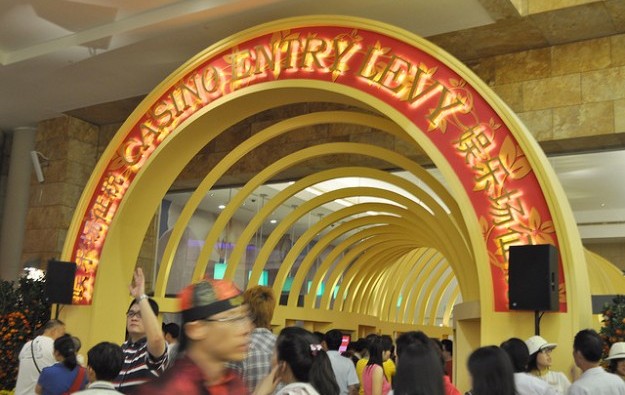No solid evidence showing casino entry levies work: scholar
May 18, 2018 Newsdesk G2E Asia 2018, Latest News

There is a lack of empirical evidence documenting the effectiveness of casino entry levies as a tool to reduce problem gambling, says a U.S.-based expert on socio-economic impacts of gambling.
“There is no peer-reviewed empirical research published on this topic,” Kahlil Philander said on Thursday.
Mr Philander is an assistant professor at the Washington State University’s Carson College of Business. His comments were made during a panel dedicated to casino entry levies as a tool to promote responsible gambling, part of the conference track of Global Gaming Expo (G2E) Asia 2018.
The scholar published last year an academic paper titled “Entry Fees as a Responsible Gambling Tool: An Economic Analysis”, available in the UNLV Gaming Research and Review Journal.
Mr Philander wrote at the time: “As the theoretical support for entry levies is weak, policymakers should be cautious about their appearance in legislation. Policymakers and operators would appear to be better served to focus on responsible gambling tools with strong evidence of effectiveness and to develop responsible gambling programmes in areas with emerging evidence, such as positive play.”
In his 2017 paper, Mr Philander noted that more research was needed on entry fees, “and without this insight, unintended consequences can emerge”.
“For example, a fixed entry fee may increase the share of binge gambling sessions, as consumers seek to maximise their allotted time in the venue,” he explained.
A bill endorsed by the Japanese government in late April as part of the efforts to establish a casino industry in that country, sets a JPY6,000 (US$54.2) casino entry fee for locals for 24-hour access, and limits casino visits by Japanese to three times a week and 10 times per month in aggregate.
A similar model is in use at South Korea’s Kangwon Land casino, the only property in that country where South Koreans are allowed to gamble.
Singapore imposes on Singapore citizens and permanent residents a statutory entry levy of either SGD100 (US$74.5) for 24-hour access, or SGD2,000 for a year’s entry but is content to give foreigners free access. Singapore does however strictly enforce its levy on locals and forbids its two casino resorts from either reimbursing levy fees to players or offering incentives or complimentary items for renewal of the yearly levy.
In his Thursday comments, Mr Philander said it was “quite concerning” to see that so many jurisdictions – particularly in Asia – had adopted or were considering adopting casino entry fees as a tool to promote responsible gambling, given the lack of evidence regarding their effectiveness.
“You look at Japan: it will probably be the second biggest [casino] market in the world once it is up and running,” he said. “And they are adopting this apparently as one of the main pillars of their responsible gambling [strategy]. It is disconcerting.”
Related articles
-
 Universal Ent raises US$800mln to...
Universal Ent raises US$800mln to...Jul 24, 2024
-
 Konami says lowering public investor...
Konami says lowering public investor...Jun 27, 2024
More news
-
 Donaco EBITDA up y-o-y to above US$4mln...
Donaco EBITDA up y-o-y to above US$4mln...Jul 26, 2024
-
 HK listed Palasino upgrades Czech...
HK listed Palasino upgrades Czech...Jul 26, 2024
Latest News
Jul 26, 2024
Border-casino operator Donaco International Ltd has achieved a 164.17-percent year-on-year increase in its latest quarterly group earnings before interest, taxation, depreciation and amortisation...Sign up to our FREE Newsletter
 (Click here for more)
(Click here for more)
Pick of the Day
”We’ve got more traction outside of Macau at the moment. But Macau’s going be a bigger focus for us”
David Punter
Regional representative at Konami Australia
Most Popular
 Sheraton brand to exit Londoner Macao, to be Londoner Grand July 25, 2024
Sheraton brand to exit Londoner Macao, to be Londoner Grand July 25, 2024  Macau regulator probes unlicensed gaming agents July 24, 2024
Macau regulator probes unlicensed gaming agents July 24, 2024  Philippines gives 20k aliens in POGOs 60 days to leave July 25, 2024
Philippines gives 20k aliens in POGOs 60 days to leave July 25, 2024  Philippines-listed DigiPlus says not affected by POGO ban July 24, 2024
Philippines-listed DigiPlus says not affected by POGO ban July 24, 2024  Sands China 2Q EBITDA down q-o-q amid low hold, renovation July 25, 2024
Sands China 2Q EBITDA down q-o-q amid low hold, renovation July 25, 2024






